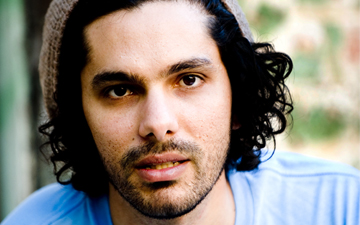Luka Lesson brings poetic justice to Australia
YOUR words have the power to ignite social change. Find out how young Australian migrant Luka Lesson is using poetry and hip-hop to speak up about racism and all things unjust.
Luka Lesson is many things.
He is the current National Slam Champion, the co-director of the Centre for Poetics and Justice, a conscious hip-hop artist, a teacher of Indigenous Studies.
As UK performance poet Charlie Dark describes, he is the “young Saul Williams”.
A young Australian migrant, he has helped many marginalised young people find their own voice, to speak up about racism and all things unjust.
Few artists are able to speak of their past so bluntly, but Luka is far from conventional.
In an earlier interview with Melbournespoken.com, he speaks of how he too had once been “an unknown depressed poor artist and sufferer of racism” .
[youtube]http://www.youtube.com/watch?v=0eNzwfTyGxA[/youtube]
Growing up in a traditional Greek family, teaching Indigenous Studies, he moved to Melbourne and found a group of multi-national poet friends. His journey has never been short of a culture blend.
He believes multiculturalism plays an important part in nurturing the arts in Australia.
“It makes things much more seamless, real and elaborative,” Luka says.
The large ethnic artist community in Melbourne attracted the slam poet to move from his home in Brisbane but even then, he sees himself an “anomaly” in the few communities he can identify with.
“So it means, I live in liminal space wherever I go”, he laughs.
“I go to the Greek community, they’d say you don’t come to church anymore and you are not a generic Greek guy that works in a business. That’s true. I do poetry. I do Hip Hop. In a Hip Hop community, they’d ask me, you are a poet, aren’t you? In a poets’ group, they’d say you’re a rapper poet,” he says.
[youtube]http://www.youtube.com/watch?v=CJOtPjuFMAk[/youtube]
Though real life stereotypes leave him with constraints of consonance, his poems often transcend these boundaries, and he uses his experiences to confront his audience.
It’s exactly what he has done with his debut album “Please Resist Me”.
“Please resist me; colonise me, comprise me and conflict me… because your resistance brings my evolution,” he writes in his feature track.
[youtube]http://www.youtube.com/watch?v=iwRi3fi8j6A[/youtube]
Luka stirs the upbeat spirits, unleashes the anger, frustration and ironically his appreciation of living in resistance.
“Unfortunately there’s a lot of racism, trouble and hardship of people that are coloured and trying to find work”, he says of the mainstream art scene.
“Having a multicultural crew just makes it more global but also more Australian because all these voices are talking about migration and change.”
Along with his group of friends from different backgrounds who also aspire to empower the slam poetry community further, Luka founded the Centre of Poetic and Justice in mid 2010. One of the resolutions of the organisation is to forsake slam poetry’s dependence on funding.
“I wanted to start an organisation that doesn’t necessarily need funding. We existed in a real world that people would pay to come to our workshops and pay for our poetry events because of the quality of our work”, Luka says.
In his seven years of conducting workshops, he has come to realise the importance of establishing independence for community artists.
“I got over being angry with the system. Now I just kind of make my work as good as possible so no one can argue with me,” he says.
Apart from his hunger for freedom of expression, Luka is also a strong believer in his power to ignite social change. A combination of justice and poetics to him, is therefore inevitable.
“Poetry is really the vehicle for thoughts. I don’t think we could do with just a centre of poetics, it wouldn’t mean as much. Having a centre for justice wouldn’t mean anything either because it wouldn’t have the vehicle,” he says.
Like most artists, once the debut album has established a high ground, it usually takes a while to create more good works that will follow.
In the same interview with Melbournespokenword.com, he describes the culmination of his debut album as “17 tracks of blood, sweat and tears”, and he doesn’t think he will put out something like that again.
Now dedicated to inspiring more young people to stand up and express their thoughts, Lesson has found a new channel to accomplish activism in his very own way.
“Through our workshops, people transform some of their negative things into positive ones. There are enough people who have told me that I inspire them to write. That’s all the activity I need in life.”
Visit Luka Lesson’s website to check out his works, upcoming gigs, and his involvement with the Centre for Poetics and Justice.

